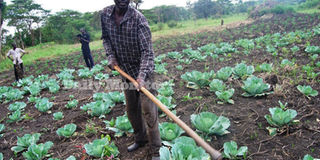Prime
Ex-soldier finds fortune in vegetable growing

Anywar weeding his cabbages. PHOTO BY JOHN OKOT
What you need to know:
- From a professional soldier to a farmer growing vegetables on a commercial scale and keeping livestock to diversify his farming business, Sadat Anywar told John Okot how he made the transition from one occupation to another.
- Averagely, he pays each of the casual labourers Shs20,000 per day depending on the tasks that he needs to be done.
- “Since this business is still growing, I don’t have permanent workers, most of the work is done by me and my family members,” he explains.
Since Lt. Sadat Anywar quit the army, his life has never been the same as he ventured into commercial vegetable growing in Gee village, Koch Goma Sub-county in Nwoya District.
Prior to retirement, he worked as a store keeper but his salary was meagre to enable him solve his financial constraints then.
After leaving the army, life became even harder when he engaged in farming but mostly for subsistence. It was not until he began commercial farming that he started yielding fruits.
How he started
In 2009, Lt. Anywar together with his family members decided to go back to his village and start some business that could sustain the family and meet their needs.
He bought six tins of cabbage seed at Shs25,000 and green pepper at Shs16,000. After that, he set up a nursery bed for them.
It took two weeks for the seeds to sprout before they were transplanted to the main garden. It was on ancestral land that was passed on through generations.
He partitioned accordingly for every vegetable—cabbages, onions and green pepper.
“I used to grow staple crops like maize and beans on small scale because everyone was growing them. Later, after a discussion with my wife, we learnt that we could grow vegetables because they are profitable especially during the dry season,” he recalls.
Market.
Some of Anywar’s customers buy from him at farm gate where he sells a big cabbage at Shs1,000 and a small one at Shs500. The green pepper and onions he measures for Shs500 and Shs1,000 depending on the amount.
The other customers are based within the district—Anaka and Koch Goma—and in Gulu Town, who purchase his produce at wholesale prices. “I supply to them in sacks at Shs60,000 each for cabbages and green pepper, and the onions at Shs80,000 each.’’
He earns an average of Shs1.4m monthly from the vegetables.
Besides vegetables, Anywar also grows rice on 10 acres, which he intends to expand to 15 acres by next year. With the expansion, he plans to include Irish potatoes and other vegetables such as tomatoes.
Proceeds
With the proceeds from the vegetables, Anwyar has been able to buy livestock to diversify his farming enterprise.
He has 20 goats, four oxen, two pigs, 10 ducks and 15 chickens, which also help to supplement his earnings. “I earn at least Shs 20,000 daily, and I have been able to provide all basics needs in my home”, he says.
“I also get at least Shs100,000 on a monthly basis from hiring out my oxen to those who want to cultivate land.”
Anywar also looks after his extended family in addition to his children for whom he also pays school fees.
Send A Cow, a non-governmental organisation (NGO), has also trained him on good farming methods.
“They make periodical assessment of my performance as I also received animals from them as well as free veterinary services,” he says.
Challenges
According to Anywar, paying for labour force to clear the land before cultivation is costly. Each casual labourer is paid Shs20,000 per day to clear the bush.
“Every time, I have to dig deep into my pockets for this and also buy pesticides and other chemicals to prevent pests and diseases from attacking my garden,” Anywar adds.
The other challenge is price fluctuation. It is a setback whenever the price falls especially during wet seasons, when there is a huge supply of vegetables in the market.
Future plans
Anywar intends to build a four-roomed house which will include a retail shop.
He wants to expand the market to neighbouring districts and South Sudan to meet the demands
“My plan is to buy a pick up truck that I know will also help transport my vegetables anywhere whenever they are needed,” he says of his ambitions for the future.
Labour
Anywar does not have permanent labourers or workers that he employs for his crop and livestock farming enterprises.
Instead he contracts casual labourers only in times of clearing land or tilling it to plant and at the time of harvesting.
This is when an extra pairs of hands is very much needed.
Averagely, he pays each of the casual labourers Shs20,000 per day depending on the tasks that he needs to be done.
“Since this business is still growing, I don’t have permanent workers, most of the work is done by me and my family members,” he explains.




